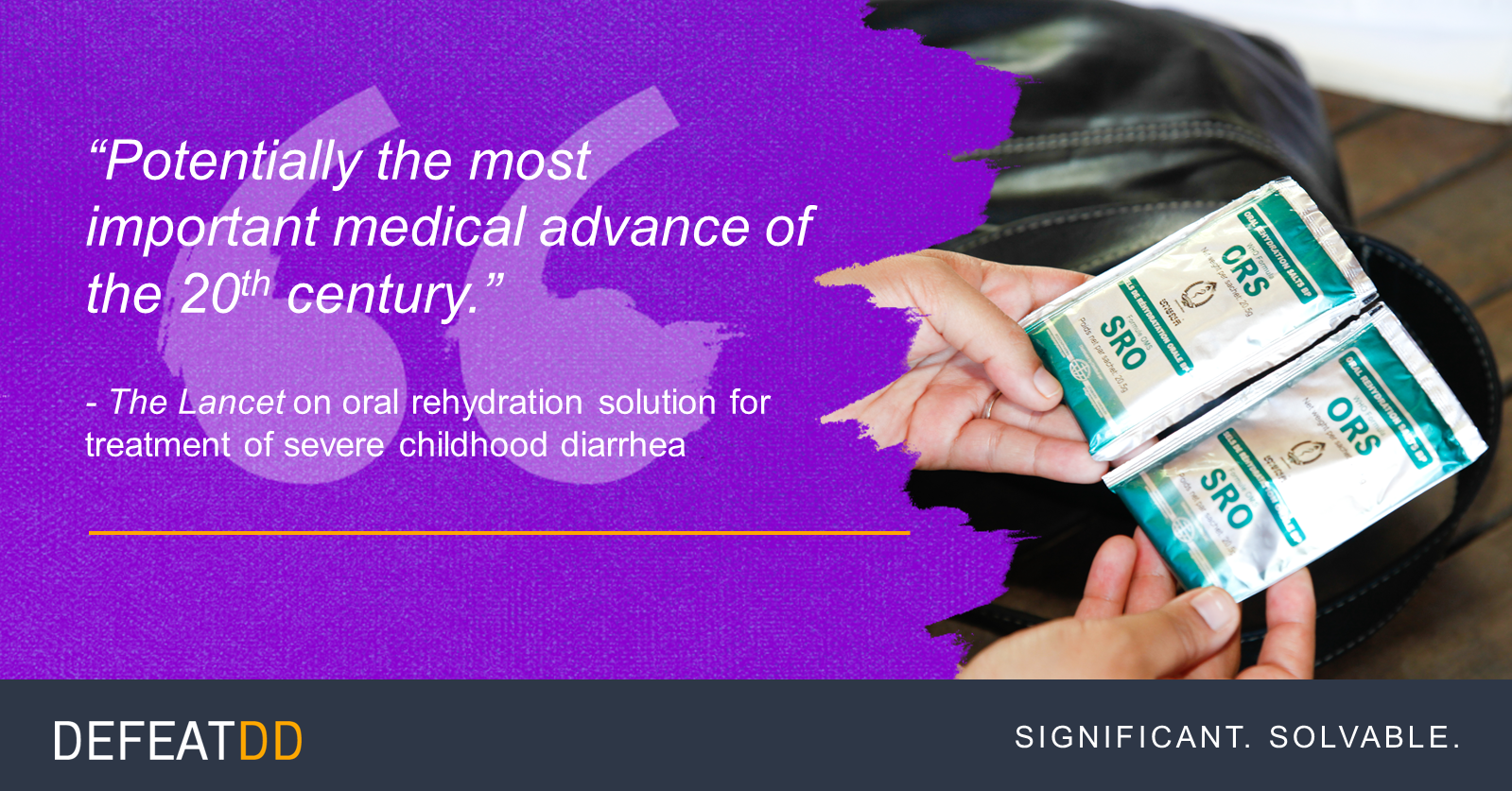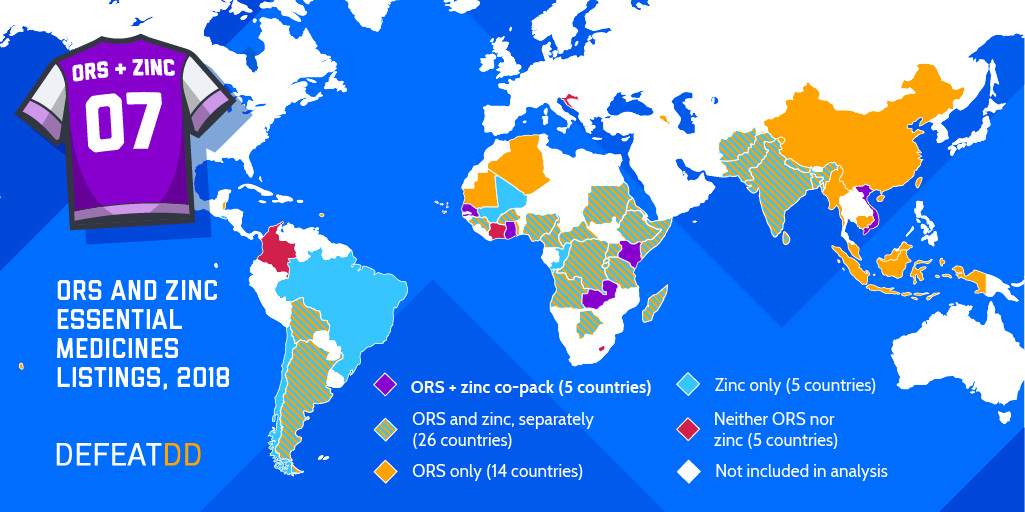Diarrheal Disease Solutions
ORS & Zinc
Diarrhea causes dehydration and a loss of nutrients, so it’s important to address both. Oral rehydration solutions (ORS) replenish fluids and electrolytes, and zinc supplements help to restore levels of the micronutrient (and subsequently limit the severity of diarrheal episodes and prevent future ones). Together, they address the immediate dangers posed by diarrheal episodes and help to restore good health.
ORS
ORS is a simple, lifesaving mixture of sugar and salt added to clean water that caregivers can give to children at home.
-
Problem: diarrhea-related dehydration
Diarrhea becomes fatal when it leads to severe dehydration.
Children in developing countries suffer from dehydrating diarrhea an average of four times per year. But the rate of ORS use in high-burden settings is less than half; often, caregivers don’t know about or can’t access ORS and zinc, or they are given an antibiotic by a private seller who wants a higher profit. Unfortunately, access is often lowest where the disease burden is highest, and there is often significant variation within countries.
-
Solution: effective rehydration
ORS rehydrates by replacing fluids and electrolytes lost through diarrhea. It should always be the first line of defense to prevent and address diarrhea-related dehydration.
The World Health Organization (WHO) and UNICEF recommend low-osmolarity ORS, an improved formula made available in 2001 that improves efficacy and reduces the need for intravenous fluids at a clinic. It is packaged as a powder to be mixed with safe water. It’s easy to use and can be administered by a health care provider or at home.
Many myths about diarrhea treatment persist in communities, and the success of ORS depends on community awareness, affordability, and uptake. Co-packaged ORS and zinc is a powerful new tool that can help address these principles of access, and precision mapping can help reveal where access is still low. Use the Institute of Health Metrics and Evaluation’s interactive maps to see the levels of ORS access in your country.
If and when a diarrhea episode becomes severe, a child may need intravenous fluids and urgent medical care.
-
Impact: treat dehydration, save lives

ORS is a high-impact, low-cost tool that has saved countless lives. A review of 157 studies showed that ORS reduced deaths from diarrhea by 69%.
In the 1980s, Jim Grant, then the head of UNICEF, became the first high-profile champion of ORS. By 1990, an astounding two-thirds of families in low-income countries had access to ORS.
That increase in access to treatment amounted to 1.5 million children’s lives saved from diarrhea each year. With a commitment to equity, we can save even more lives.
-
Global guidance: ORS and zinc
WHO and UNICEF recommend the use of ORS and zinc for the treatment of acute diarrhea.
In July 2019, WHO added co-packaged ORS and zinc to its essential medicines list for children (EMLc), harmonizing with diarrhea treatment best practices. So far, seven countries have updated national policies to reflect global guidance: Ghana, Ethiopia, Nigeria, Senegal, Kenya, Zambia, and Vietnam.
-
Problem: essential nutrients depleted during diarrhea
Zinc and other micronutrients can become depleted through diarrhea, and zinc-deficient (and otherwise malnourished) children are more prone to diarrhea, too.
-
Solution: zinc supplementation wth ORS
Zinc is a safe and effective treatment option that can reduce the duration and severity of diarrhea and prevent future episodes.
Zinc can be given as a syrup or as a tablet that is dissolved in clean water or breast milk. When using zinc to treat diarrhea, it is important that caregivers are educated about the importance of giving the full course of zinc treatment in conjunction with ORS. The coverage rate of zinc and ORS together per World Health Organization guidelines is only 15%.
-
Impact: treat infections, save lives
Zinc can reduce the duration of illness by 25 percent and prevent recurrence of disease for up to three months. This combined treatment is highly cost-effective and easily administered by caregivers at home.
The UN Commission on Life-Saving Commodities for Women and Children named zinc and ORS as two of thirteen essential commodities that could contribute to saving more than 6 million lives. The Integrated Global Action Plan for Pneumonia and Diarrhea (GAPPD) includes ORS and zinc. The International Zinc Nutrition Consultative Group, among others, have come together to address barriers to access.
-
Global guidance: ORS and zinc
WHO and UNICEF recommend the use of ORS and zinc for the treatment of acute diarrhea.
In July 2019, WHO added co-packaged ORS and zinc to its essential medicines list for children (EMLc), harmonizing with diarrhea treatment best practices. So far, seven countries have updated national policies to reflect global guidance: Ghana, Ethiopia, Nigeria, Senegal, Kenya, Zambia, and Vietnam.

Ghana, Zambia, Kenya, Senegal, and Vietnam are the only countries so far that have added co-packaged ORS and zinc into their national essential medicines lists. Take action.


